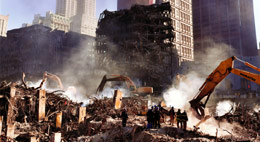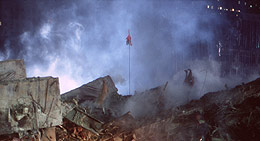 Listen
to whole show in RealAudio
Listen
to whole show in RealAudio
 |
| It's
evocative and poignant to stand at memorial sites and
remember. In part, it's a step toward personal healing,
but there's a collective compassion among travelers
who go to bear witness at the sites of tragedies. As
part of our examination of the travel landscape post-9/11,
Savvy Traveler host Diana Nyad talks with our Traveler-at-Large,
Tony Kahn, who visited Ground Zero in New York and Pearl
Harbor, and Atlantic Monthly National Correspondent
William Langewiesche, who spent 9 months as an invited
journalist with unparalleled access at the World Trade
Center site, about the value of traveling to memorials.
What
does it take for a memorial to outlast its victims?
How could such devastation happen at such innocent
locations? And, how do can we best remember the victims
-- not as casualties but -- as human beings who lost
their lives?
People
deal with tragedies in different ways. Rik Reppe,
got in his truck and drove to all three of the 9/11
sites. When he came back, he wrote a play about his
experiences called "Staggering Toward America"...
 Listen
in RealAudio
Listen
in RealAudio
|
 |
|
|
|
|
|
 |
| What
has happened this past year to the travel industry?
And, what is going to happen to it? Diana explores these
questions, and a number of others, in a roundtable discussion
with Jeff Greenwald, author of Scratching the Surface,
Joe Sharkey, business travel columnist for The New
York Times, and our Travel-Expert-in-Residence,
Rudy Maxa.
Due
to the significant ramifications of the tragedy of
9/11, this is an enormous time of flux in the skies.
With numerous security hassles and worries affecting
the psychology of the traveler, what are airlines
trying to do to lure them back? When will tourism
rebound, and how long will it take? What about the
sudden trend of the “big boys” vs. the “little
guys,” as smaller jet lines gain prominence while
larger airlines struggle. Also, what’s the American
image abroad? And, does travel really bring us closer
together?
 Listen
in RealAudio
Listen
in RealAudio
|
 |
|
|
|
|
|
 |
| Travel
is an exercise in curiosity: a meaningful way to see
the new and examine the foreign. The futile acts of
9/11 have challenged our notion of traveling. They've
even changed our collective identity in the eyes of
those in foreign lands. So, how are we perceived abroad?
Diana discusses these issues with the Atlantic Monthly's
William Langewiesche, the invited WTC site reporter,
and commentator and author Richard Rodriguez, whose
most recent book "Brown" takes in-depth look at the
swirling of races, cultures and religions in today's
world -- especially, in America.
Our
ability to travel so quickly, even to the most remote
corners, has made the world so small -- but are we
still ignorant of its vastness, its varied peoples
and cultures? Has this naiveté made our world more
dangerous for us? Has 9/11 changed the way Americans
are being perceived when traveling? Have the events
of 9/11, or even its resulting policies, made Americans
feel more isolated when in other countries?  Listen
in RealAudio
Listen
in RealAudio
|
 |
|
|
|
|
|
Joel
Meyerowitz's photographs are part of an archive of more than 8,000 photographs
he made at the World Trade Center site between September 23, 2001 and
May 30, 2002. These photographs, known as "The World Trade Center Archive"
will be digitized for research purposes and made available through museums
and institutions as a public resource.
There is
a need for additional funds to complete the archive. Information about
supporting this project is available at www.21stcenturyphotoresources.org.You
can also visit www.joelmeyerowitz.com.
|












